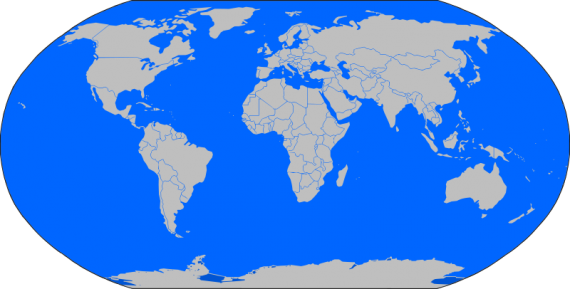International Sitrep
A capsule look at the world situation as 2010 draws to a close.
As 2010 draws to a close it seems appropriate to consider the state of the world as we find it while the year ebbs out. I’ve already posted a similar consideration of our domestic situation at my own blog, The Glittering Eye.
Europe
Greek labor unions have stepped up their protests of the Greek governments austerity budget, part of the agreement hammered out between the Greek government and the other members of the European Union in order to bail Greece out of the public debt crisis in which it has placed itself. Portugal, Ireland, Spain, and Italy have also introduced their own austerity measures. While Germany, Europe’s 800 lb. economic gorilla, may grudgingly bail out Greece or Portugal there is no prospect whatever for it offering similar relief to Spain and Europeans are beginning to think about the unthinkable: abandoning the euro.
Whether the new European Stability Mechanism will actually work remains in doubt. A key problem is that Germany’s participation in the euro presents as many problems as does Greece and Portugal’s.
Europe’s policy with respect to Belarus is in tatters following the re-election of the country’s president amid widespread claims of fraud. The nerve-wracking economic situation of the last several years has generally placed a crimp on the overtures that the EU had been making towards countries on its eastern border.
A toxic waste spill at an aluminum plant in Hungary in October polluted the Danube and some of its tributaries and may damage the environment of the area drained by the Danube, one of the world’s great rivers, for years to come.
The Middle East
The number of crisis points in the Middle East is increasing, if anything. Few believe that the tensions or even outright hostilities between the Israelis and Palestinians will be calmed any time soon. After nearly nine months of wrangling Iraq has produced a government. Under the present status of forces agreement between the Iraqi government and the United States, the U. S. is to have all of its forces removed from Iraq by the end of 2011 although it is possible that the new Iraqi government may wish to revise the agreement to enable the U. S. to stay or even to withdraw ahead of schedule. Either of these outcomes would pose political or logistical problems or both for the United States.
Iran’s nuclear development program, which may have been slowed by the Stuxnet computer worm, continues to proceed in its course. If the Iranian nuclear program actually produces a nuclear weapon, all bets are off.
South Asia
The third review of its Afghanistan policy by the Obama Administration was concluded last week and received with a mixture of support and skepticism. Whether the administration follows through with President Obama’s promise to begin withdrawing troops from Afghanistan next year, withdraws a token number of troops to satisfy the promise nominally, or finds pressing reasons not to withdraw troops from Afghanistan, popular support in the United States for our efforts there continue to weaken.
A central paradox of those efforts continues to be that it is not logistically possible for the United States to prosecute a major land effort in Afghanistan without the cooperation of the Pakistan government and, as we have seen, that cooperation is grudging to say the least.
Despite the pain that the situation in Afghanistan brings to the United States, the biggest story in South Asia in the coming year may be whether India’s tentative or even contentious relations with its two largest neighbors, China and Pakistan, become friendlier or cause India to draw closer to the United States.
The Far East
The ratcheting up of tensions on the Korean Peninsula continues. North Korean military authorities boast of new artillery attacks on South Korea; South Korean security experts warn of new attacks to come.
China continues to have problems with inflation. By some accounts the year-over-year increases in food prices have topped 10%. With food comprising as much as 50% of an ordinary Chinese family’s income, increases in the cost of food at that rate constitute an extremely serious problem.
China’s peg of the yuan to the dollar compounds China’s problem in managing its currency. It can control prices or maintain the peg but it cannot do both.
The Americas
13,000 people were killed in 2010 in the ongoing conflict between federal forces and drug cartels in Mexico. There’s plenty of finger-pointing from both sides of the border with Mexicans blaming American firearms and drug users and Americans blaming Mexican official corruption and criminal gangs.
A half year after the earthquake that struck Haiti, the country remains in ruins. The cholera outbreak there that began in October remains under way. Haiti may already have the largest number of international aid workers per capita population. It’s difficult to envision a solution to the country’s problems.
I would welcome my Outside the Beltway colleagues adding their own reflections to this post or amplifying this post with sitreps of their own.




Dave, thanx for my end of year upbeat assessment of what the future holds:
We…. are…. f*cked.
thanx a lot and a happy new year to you too!
Dave:
One of the good things about getting old is the comfort you can take from having seen worse.
No USSR, no nuclear stand-off, no tanks at the Fulda Gap, no flash points likely to escalate out of control, no real ideological contest, few South American tyrants, Africa no worse than it has been. I don’t mean to sound at all indifferent to the human cost, but Afghanistan is a small-bore problem — more a money pit than anything else. And as dangerous as it could be, North Korea might also represent an opportunity for some resolution. SK, the Japanese and the US are holding together and the Chinese must recognize that this thing is better managed between the major powers than allowed to dissolve in chaos.
The only really worrisome things for me are Iran and the economic fragility of the EU.
If I were Chinese I’d be worried as hell about jacking up food prices on peasants who’ve seen just enough to know that there are millionaires in Shanghai and Beijing. Add if NK collapses and we don’t have some kind of management agreement in place that could be a major pain. I’d rather be holding our hand than theirs. (Not that we’re holding a royal flush by any means.)
Tom:
Nonsense. Still no sign of the zombie apocalypse. Chin up. Glass half full!
Which reminds me of one of my favorite jokes. The optimist says “The glass is half full.” The pessimist says “The glass is half empty.” The engineer says “The glass is too large.”
I agree with you on China, Michael. I think that is is possible that China can deal with the many daunting problems that it faces but I also think that is very unlikely that it will be able to do so.
We sort of have a government in Iraq. I am still more concerned about India vs Pakistan than India vs China. I think the latter will remain an economics war for a bit longer. An energy crisis, say we bomb Iran, could change that.
Steve
It’s been a long while since I heard or saw the word “SITREP” in print any where.
Good assessment. Thank-you.